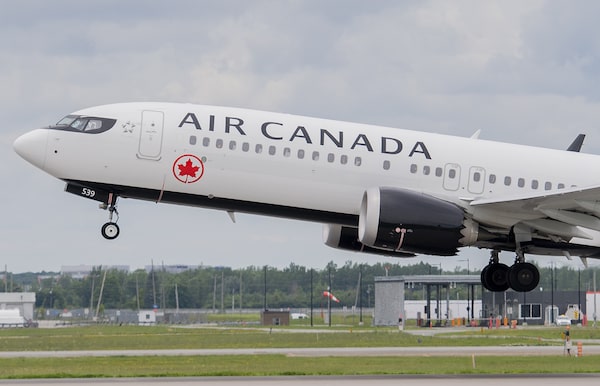
An Air Canada jet takes off from Trudeau Airport in Montreal on June 30.Graham Hughes/The Canadian Press
Listen to anyone who has tried to board a plane recently and you might conclude that flight cancellations and airport mayhem make this the worst-ever time to fly.
Perhaps it is, but the stock market is suggesting the worst may be over.
Air Canada’s AC-T share price has rebounded about 10 per cent from its recent low in July, soon after the airline announced the cancellation of dozens of daily flights in the summer, amid what the airline’s chief executive Michael Rousseau called “strains on all aspects of the global aviation system.”
Turns out, buying the stock at a time when complaints about lost luggage and absurd lineups were leading nightly television newscasts in July was a profitable strategy.
The reason: It may have marked peak misery about travel.
Modest improvements since then have come as a huge relief – and less-bad is good enough for investors not currently glaring at an empty spinning luggage carousel and wondering why they ever left home.
Kevin Chiang, an analyst at CIBC Capital Markets, noted last week that some numbers related to air travel are moving in the right direction.
“A look at flight cancellation and delay data for select Canadian airlines flying into U.S. airports shows a peak in early July,” Mr. Chiang said in a note.
On July 2, he said, 15.5 per cent of flights by Canadian airlines were cancelled and 72.4 per cent of flights were delayed. By Aug. 14, though, the situation had improved: Just 4.4 per cent of flights were cancelled and 57.2 per cent of flights were delayed.
Air Canada posts $386-million second-quarter loss, sees ticket sales soar
Admittedly, travellers might not cheer the trend because the situation still reflects dysfunctional travel that has prevented airlines from taking advantage of soaring demand. In 2019, prior to the pandemic, annual average cancellations and delays were far lower, at 2.1 per cent and 28.6 per cent, respectively, Mr. Chiang said.
Still, investors who look ahead may see an opportunity in the airline sector if the improvements continue while demand for travel remains strong.
That’s because stock prices remain well off their recent highs.
The S&P 500 Airlines Industry Index has recovered about 7 per cent this summer, but it is down 25 per cent since May, reflecting the global challenges facing the sector. More specifically, United Airlines Holdings Inc. is down about 28 per cent over this period. And despite its summer rebound, Air Canada is down about 25 per cent over a similar four-month period.
A number of analysts argue that these beaten-up stock prices are reflecting concerns about rising interest rates and a looming economic slowdown, and virtually ignoring the pickup in travel demand this year.
“We view Air Canada as one of our top picks for ongoing recovery in fundamentals, contrary to general investor concerns about macro and cyclical sectors given high inflation and rate hikes,” Konark Gupta, an analyst at Bank of Nova Scotia, said in a note.
Air Canada expects that its capacity in the third quarter will recover to 79 per cent of 2019 levels – before the start of the pandemic – which is up from 73 per cent in the second quarter and just 55 per cent in the first quarter.
Mr. Gupta noted that Air Canada is now carrying about 135,000 passengers a day, which is not far from the airline’s 159,000 daily passengers in the third quarter of 2019.
The moderating price of fuel offers another bullish trend for investors to follow.
Jet fuel touched $1.72 a litre in May, or well over double its average price in 2019, according to Mr. Gupta.
But the price has since retreated to $1.18 a litre, offering relief to the airline’s margins and easing concerns over rising ticket prices weighing on demand.
Air Canada denying passenger compensation claims for staff shortages, citing safety
What should investors expect next?
The summer travel season is winding down, which should provide further improvements to the number of delays and cancellations. But that means attention will shift to more economically sensitive customers.
“The focus now pivots to corporate travel and the extent to which it returns from September onward,” Mr. Chiang said.
He’s optimistic, given strong visitor traffic to travel-related websites and the healthy booking trends reported by North American airlines during their recent second-quarter reporting season.
Airline stocks have been volatile this year. But the frequent dips can be rewarding.
Be smart with your money. Get the latest investing insights delivered right to your inbox three times a week, with the Globe Investor newsletter. Sign up today.